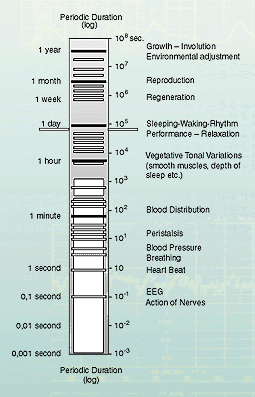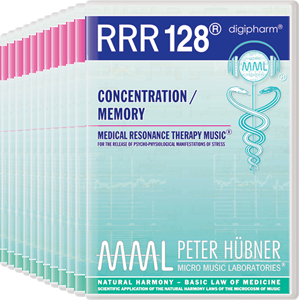| サイエンティフィック・ミュージック・メディスン | |
| Home • Site Map • Research • Reports • 国際的専門家 • Music Preparations • Fundamentals • News • ペーター・ヒューブナー • Store • Contact | |

Prof. Dr. med. Gunther Hildebrandt • Chronobiological Aspects of Music Physiology
Rhythm in normal musical experience, be it for aesthetic enjoyment or with an
educational and therapeutic purpose, assumes there are structures in humans which
follow musical conformities to a natural law.
This is not only true for the immediate receiving organ of hearing, for which e.g. in the form of a snail corresponding laws of formation are known (cf. HAASE 1976), but it must apply to the whole organism; for the whole of a human being participates as a moving organism, as a sensory organism and as an intellectual organism in experiencing music.
Music and musical movement are art forms which are realized in a time area and form time organisms. Of the basic elements of music (melodics, rhythmics, metrics, harmony, agogics, etc.), metrics, rhythmics and agogics are mainly temporal determinations.
Melodics and harmony are at first glance more likely to present elements of an aesthetic content, but they also are ultimately based on regulating features determined by time with regard to tonal steps and tonal conditions.
There is therefore sufficient reason to search for biological time structures in humans which can be considered for the musical work and experience as equivalent or reagent – whatever their nature might be. Particularly in view of the educational and therapeutic resources of music, it is likely to be of importance to know in which way and where musical-temporal function orders and structures are realized in the organism.
The results of modern chronobiology and chronomedicine have shown that the human organism does not only have a complicated interior design in terms of space structure, but also has a highly sophisticated time design which is built up from numerous rhythmical time structures.
This is not only true for the immediate receiving organ of hearing, for which e.g. in the form of a snail corresponding laws of formation are known (cf. HAASE 1976), but it must apply to the whole organism; for the whole of a human being participates as a moving organism, as a sensory organism and as an intellectual organism in experiencing music.
Music and musical movement are art forms which are realized in a time area and form time organisms. Of the basic elements of music (melodics, rhythmics, metrics, harmony, agogics, etc.), metrics, rhythmics and agogics are mainly temporal determinations.
Melodics and harmony are at first glance more likely to present elements of an aesthetic content, but they also are ultimately based on regulating features determined by time with regard to tonal steps and tonal conditions.
There is therefore sufficient reason to search for biological time structures in humans which can be considered for the musical work and experience as equivalent or reagent – whatever their nature might be. Particularly in view of the educational and therapeutic resources of music, it is likely to be of importance to know in which way and where musical-temporal function orders and structures are realized in the organism.
The results of modern chronobiology and chronomedicine have shown that the human organism does not only have a complicated interior design in terms of space structure, but also has a highly sophisticated time design which is built up from numerous rhythmical time structures.

Illustration 1
Overview of the favored periodic duration (frequency ranges) of the rhythmic functions in humans. The scale of periodic duration is divided logarithmically. The stable frequency ranges of the spontaneous rhythms are specially emphasized.
(According to HILDEBRANDT 1975, changed)
Overview of the favored periodic duration (frequency ranges) of the rhythmic functions in humans. The scale of periodic duration is divided logarithmically. The stable frequency ranges of the spontaneous rhythms are specially emphasized.
(According to HILDEBRANDT 1975, changed)
Illustration 1 shows a spectrum of the main types of rhythmical functions which is arranged according to the periodic duration (logarithmically). It includes approx. 2 x 12 octaves, from approx. one millisecond to an order of one year. The series of given functions show that with an increasing periodic duration, the complexity of the rhythms grow, from the cellular rhythms via the tissue and organ rhythms to the rhythms of complex systems, and finally to those which include the entire organism and even imply beyond (reproduction and population rhythms). More and more partial functions are put together for joint action, so that a hierarchical structure exists, determining, in what way the longer wave functions also include the shorter ones in their rhythm.
|
€г—Г‹¤–ВѓZѓ‰ѓsЃ[ѓ~ѓ…Ѓ[ѓWѓbѓN®
Medical Music Preparations on CD |
| Listening Program:
Concentration / Memory 
|
|
If you like to look at the complete program, |
With kind permission of AAR EDITION INTERNATIONAL
© 1998- SCIENTIFIC MUSIC MEDICINE | Contact
Subject to change in the interests of scientific advancement.
© 1998- SCIENTIFIC MUSIC MEDICINE | Contact
Subject to change in the interests of scientific advancement.